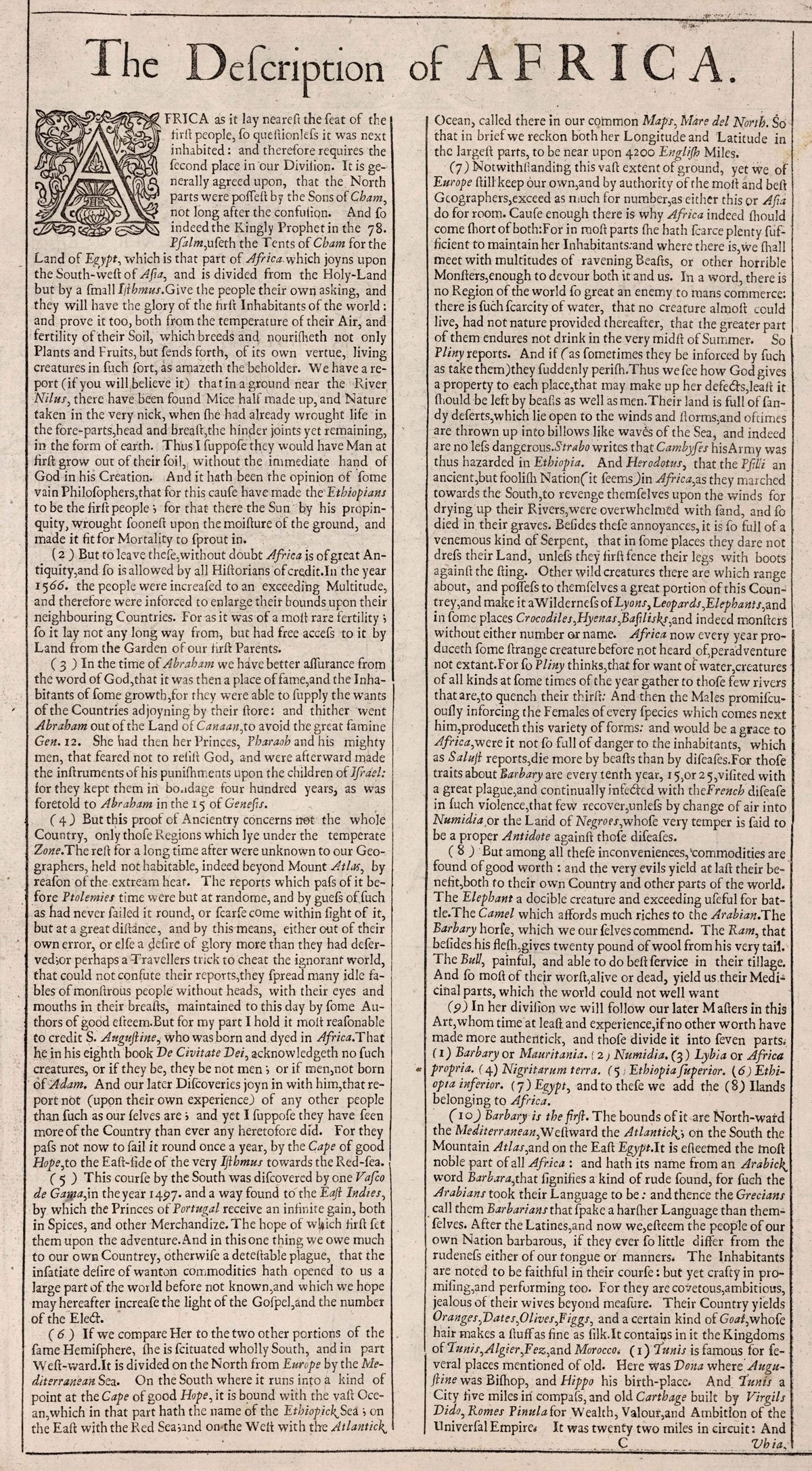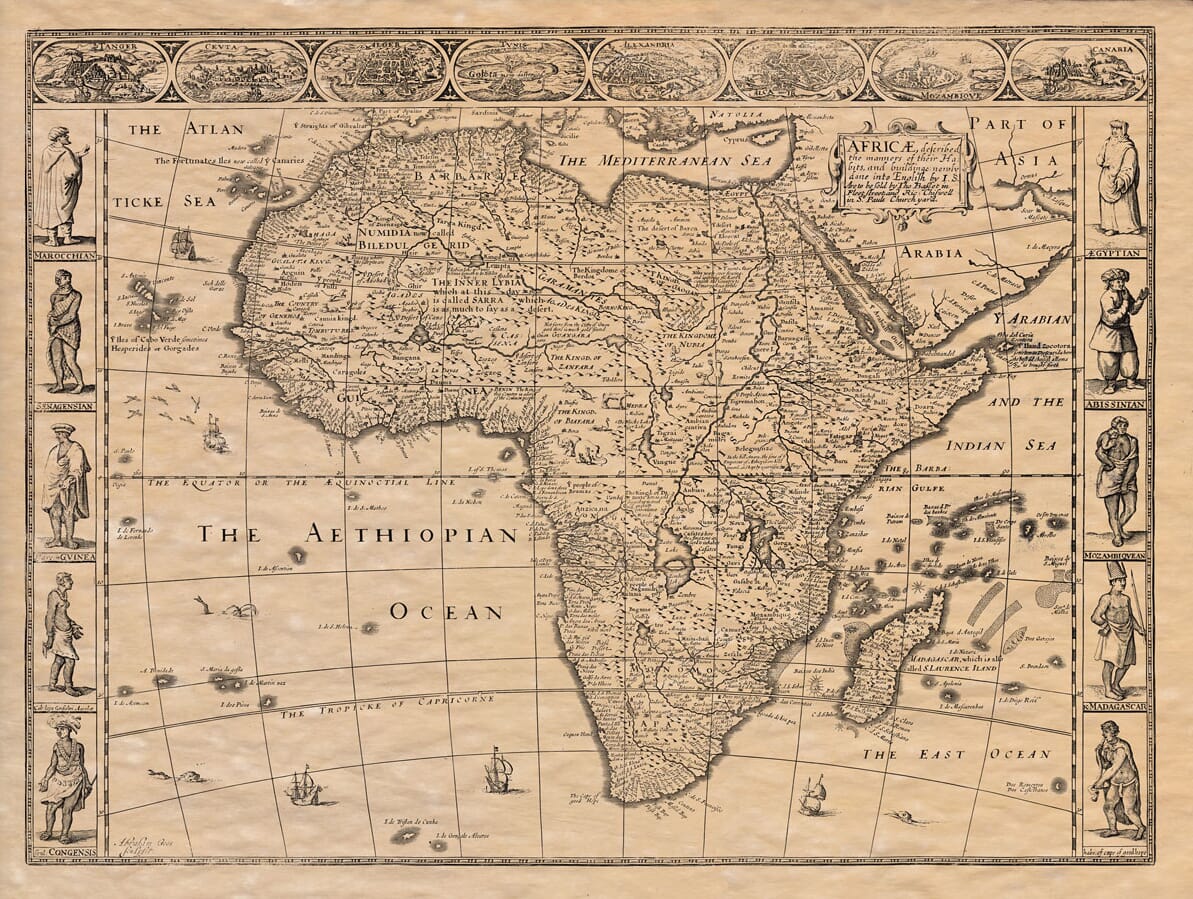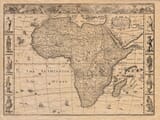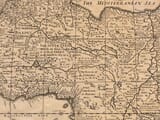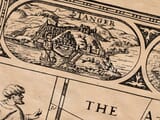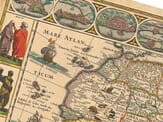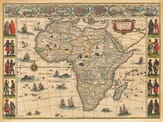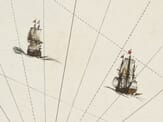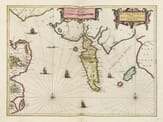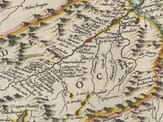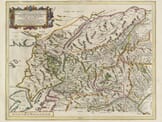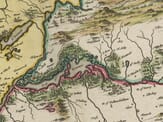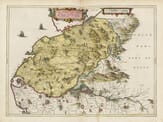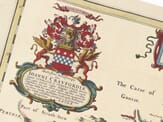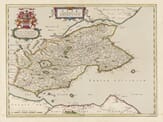Description
John Speed added notes to the rear (the verso) of his maps. This is a modern translation:
The Description of AFRICA
Africa, as it lies near the seat of the first people, to some opinions, was next inhabited; and therefore receives the second place in our division. It is generally agreed upon, that the northern parts were peopled by the sons of Cham (Ham), not long after the confusion [of languages at Babel]. And so indeed the kingly prophet in Psalm 78 calls Egypt the “Tents of Cham,” the land of Egypt, which is the part of Africa that joins upon the southwest of Asia, and is divided from the Holy Land only by a small filmy stream. Give the people what they ask—and they will have the glory of the first inhabitants of the world; and prove it too, both from the temperature of their air, and fertility of their soil, which breeds and nourishes not only plants and fruits, but forms of beasts, of its own kind; and such creatures in such fair forms, as amaze the beholder. We have a report (if you’ll believe it) that in a marsh around the river Nile, there have been found mice half made up, and nature taken in the very nick, when she had already wrought life in the foreparts, and had left the hinder joints yet remaining in the form of earth. Thus, I suppose they would have man first grow out of their soil, without the immediate hand of God in his creation. And it hath been the opinion of many philosophers, that for this cause were made the Ethiopians to be the first people; for that since the sun by his power, and antiquity, would sooner open the moisture of the ground, and made it fit for mortality to sprout in.
(2) But to leave theories: without doubt, Africa is of great antiquity, and is so believed by all historians of credit. In the year 1566, the people were increased to an exceeding multitude, and were therefore forced to enlarge their bounds upon their neighbouring countries. For so it was of old: rare fertility is to fill it any long way from us, had free access to it by land from the Garden of our First Parents.
(3) In the time of Abraham we have better assurance from the word of God, that it was once a place of famine, and the inhabitants of some growth, for they were able to supply the wants of the countries adjoining by their store: and thither went Abraham out of the land of Canaan, to avoid the great famine (Genesis 12). She had then her princes, Pharaoh and his mighty men, that feared not to resist God, and were afterward made the instruments of his punishments upon the children of Israel, for they kept them in bondage four hundred years, as was foretold to Abraham in the 15th of Genesis.
(4) But this proof of antiquity concerns not the whole country, only those regions which lie under the temperate zone. Their lot in former time were known to be rich, populous, and habitable; indeed beyond Mount Atlas, by reason of the extreme heat. The reports which pass of it here in Europe were but at random, and by guess: for such as had never sailed it round, or came often within sight of it, but at great distance; and by this means, either out of their own error, or a desire of glory more than they had deserved perhaps, travellers took to cheat the ignorant world. But could not confuse their reports, they spread many false stories of monstrous people without heads, with their eyes and mouths in their breasts, maintained to this day by some authors of good esteem. But for my part I hold it not credible, no more than St. Augustine, who was born and died in Africa. That which he thought book of De Civitate Dei, acknowledged both to be creatures, if they be such, to be men or not men, born not of Adam. And our later discoveries join with him, that no report (upon their own experience) of any other people than such as our selves are: and yet I suppose they have seen more of the country than ever any heretofore did. For they that now so fail it round once a year, by the Cape of Good Hope, to the east side of the very Isthmus towards the Red Sea.
(5) This course by the South was discovered by one Vasco da Gama in the year 1497, and a way found to the East Indies, by which the Princes of Portugal receive an infinite gain, both in spices, and other merchandise. We hope of which shall set them upon the adventure. And in those things we owe much to our own country, otherwise a detestable plague, that is a want of navigation. For commodities that enrich men to a large part of the world lie before us, and which we hope might hereafter be made the light of the Gospel, and the number of the Elect.
(6) If we compare her to the two other portions of the hemisphere, she is situated wholly in the part we call West-World, and is divided on the north from Europe by the Mediterranean Sea. On the South, where it runs into a neck of point at the Cape of Good Hope, it is bounded with the vast ocean, in which the part that has the name of the Ethiopian Sea; in the East with the Red Sea, and once the West with the Atlantic Ocean, called there in our common maps Mare del Nort. So that in brief we reckon both in longitude and latitude in the larger parts, to be near upon 4200 English miles.
(7) Notwithstanding this vast extent of ground, we of Europe still keep our own, and by authority of the most and best geographers, exceed as much in number, as either this or Asia do for room. Cast enough there is: why Africa indeed should be come forth to both. For in most parts she hath scarce plenty sufficient to maintain her inhabitants: and where there is, she hath to meet with multitudes of ravening beasts, or other horrible monsters, enough to devour both it and us. In a word, there is no region of the world to great an enemy to man’s commerce. So much scarcity of waters, that no creature almost could live, had not nature provided otherwise, that the greater part of them endure not drink in the very midst of summer. So Pliny reports. And if as sometimes they be so incensed by the air, as taken they suddenly perish. Thus we see how God gives a property to each place, that man might be deficient, and be helped of life by basics as well as meat. Their land is full of sandy deserts, which lie open to the winds and horrid sounds, often are thrown up into billows like waves of the sea, and indeed are no less dangerous. Strabo writes that Campus Hisarimy was thus hazarded in Ethiopia. And Herodotus, that the Pillars of sand, in the nation of the Garamantes in Africa, are made march towards the south, to revenge themselves upon the winds for drying up their rivers, were overwhelmed with sand, and reduced in their cities. Besides their annoyance, it is said, are venomous kind of serpents, that in some places they dare not enter the land, unless they fence their legs with boots against the sting. Other wild creatures there are which range about, and possess to themselves a great portion of this country, and make it a wilderness of lions, leopards, elephants (in some places crocodiles, hyenas, baboons), and indeed monsters without either number or name. Africa never yet produced them for image, creature before or record of parchment ever extant. For Pliny thinks that for water, creatures of all kinds at some times of the year gather to those rivers that are so, and consume their thirst. And then the males promiscuously, through the frailties of females which come nearest to him, produced this variety of forms: and would be a tragedy to Africa, were it not so full of danger to the inhabitants, of which as Solinus reports, die more by beasts than by disease. For the creature barbary are every tenth year, 15, 25, or 35 killed with a great plague, and continually infected with the same disease in such violence, that few recover, while the hot wind Nautonius in the land of Negroes, where every temper is said to be a proper antidote against the same.
(8) But among all these inconveniences, commodities are found to be very good: and the very envied yield all the best benefit, both to their own country and other parts of the world. The elephant, a docile creature and exceeds other beasts in bulk. The camel which affords much riches to the Arabian. The Barbary horse, which we often commend. The Ass, that besides his flesh, vents every pound of wool from his very tail. The bull, painful and able to do benefit forever in their life. And so most of their world alive and dead, yield their use to all parts, which the whole world could not well want.
(9) In her division we will follow our later masters in this art, until time at least and experience, inform us whether more may be made more abundant. And they divide it into four parts:
Barbary or Numidia
Mauritania (which the Arabians proper call Nigritania terra)
Ethiopia proper (to Egypt)
Egypt
And to these we add the 8 hands belonging to Africa:
(10) Barbary is the fifth. The bounds of it are the north-west and the Mediterranean, westward the Atlantic, on the south the mountain Atlas, and on the east the land of Egypt. It is the most noble part of all Africa, and has its name from an Arabic word Barbarath, which signifies a kind of sound, for such the Arabians took their language to be: and thence the Greeks call them Barbarians, that speak a harsher language than themselves. After the fall of Rome, we esteemed none to be civil but the Romans; if they were so like the Romans and none else of our former conquerors. The inhabitants are noted to either of our tongue or manners. The Latin tongue is missing, and perfuming too. For they are content only to be jealous of their wives, beyond measure. Their country yields oranges, lemons, figs, and a certain kind of good-quality musk. It has fine silk. It contains in it the Kingdoms of Tunis, Algiers, Fez, and Morocco. (11) It is famous for several places mentioned of old. Here was Duma where Augustine was Bishop, and Hippo his place. Here also were Thimis and Tidda, memorials of old courage built by Queen Dido, Femme Punica for wealth, valour, and ambition of the Universal Empire. It was twenty-two miles in circuit.
